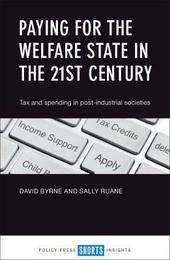
|
Paying for the Welfare State in the 21st Century: Tax and Spending in Post-Industrial Societies
Paperback / softback
Main Details
| Title |
Paying for the Welfare State in the 21st Century: Tax and Spending in Post-Industrial Societies
|
| Authors and Contributors |
By (author) David Byrne
|
|
By (author) Sally Ruane
|
| Physical Properties |
| Format:Paperback / softback | | Pages:168 | | Dimensions(mm): Height 198,Width 129 |
|
| Category/Genre | Taxation |
|---|
| ISBN/Barcode |
9781447336532
|
| Classifications | Dewey:330.126 |
|---|
| Audience | | Professional & Vocational | |
|---|
| Illustrations |
No
|
|
Publishing Details |
| Publisher |
Bristol University Press
|
| Imprint |
Policy Press
|
| Publication Date |
28 June 2017 |
| Publication Country |
United Kingdom
|
Description
Amid urgent debates around the function of welfare in the post-industrial 21st Century, and how we pay for it, David Byrne and Sally Ruane deploy the concepts and analytical tools of Marxist political economy to better understand recent developments, and the possibilities they present for social change.
Author Biography
David Byrne is Emeritus Professor of Applied Social Sciences at Durham University. His work explores the consequences of the post-industrial transition and the implications of the complexity frame of reference for understanding the social world. Sally Ruane works in the School of Applied Social Sciences at De Montfort University, Leicester, and is Deputy Director of the Health Policy Research Unit. Her research interests lie in health service reform, forms of NHS privatisation and taxation.
Reviews"Fiscal crisis, class... and taxation. This very welcome book provides a clear analysis of the class-based nature of tax systems in post-industrial capitalism." Nick Ellison, University of York "This is a timely revisit to O'Connor's seminal analysis of the welfare state in a capitalist system. David Byrne and Sally Ruane make an important argument that there is a better alternative to the financial system that is currently destroying social cohesion and feeding rising inequality. Taxation is part of the solution, not the problem." Philip Haynes, University of Brighton
|